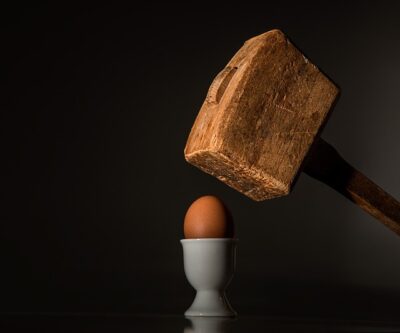Today I woke up at 6:55am, laced up my running shoes, and walked to the supermarket because it was 6:55am and I was definitely not jogging at that hour.
Why? Because New Zealand has run out of eggs. We are officially in a national egg shortage. It’s an ovo-crisis!
I mean, New Zealand has some eggs. Personally, we’ve got about 23. But there are not enough eggs. Few enough eggs that it has become common over the past month to visit the grocery store to see an entire bank of egg shelves picked entirely clean, which didn’t even occur during the height of our lockdowns.

Image by Steve Buissinne from Pixabay
Yes, people are even buying that one last carton in the corner with the cracked egg in it.
Apparently one measures these things not in terms of eggs but in terms of laying hens. Literally, the chicken came first, in this scenario. I have learned from the prestigiously-titled Stuff that we currently have 3.5 million egg laying hens (a 68% hen-to-people ratio), but we ought to have 3.8m egg laying hens (a 74% hen-to-people ratio). Those hens (and their predecessors, I suppose) laid about 92 million eggs in the year ending in June 2022, down an apparently staggering amount from 101.2m in the prior egg-laying calendar year.
Long story short, today I learned you need three hens for every four people.
The thing is: it’s not like New Zealand just found a whole lot more people. Even if we count tourism, we don’t have as many people in our borders as we did back in 2019, and there hasn’t been any chicken-specific diseases (that I’ve heard about, anyhow – and, we do have a line into the chicken community).
How did New Zealand run out of eggs?
To the best of my understanding, we actually ran out of eggs 10 years ago and just didn’t realize it until last week.
Okay, not really. But sort of. You see, in 2013 the then-conservative National Party government decided to briefly care about something, but people required too much empathy so they chose chickens. Perhaps because chickens are the closest living relative to dinosaurs? Who could say. As part of their chicken sympathy, they decided they would ban “battery chicken cages” ten years in the future, when it would be someone else’s problem.
Between then and now, a few things happened. We moved to New Zealand! The Labour Party took control of the government! A global pandemic. And, as I understand it, NZ farmers worked pretty hard and spent a pretty penny to convert all of their farms away from battery chicken cages. Some of them went free range, but about a third of those farmers without the space, margins, or inclination for free range chickens went for colony cages.
Everyone was read for the 2023 deadline to hit. So… where are the eggs?
There-in lies the rub. Maybe. No one can quite explain this part clearly in what I’ve read so far.
Apparently, our definitely-evil supermarket near-duopoly determined relatively recently that they wouldn’t buy eggs from colony systems after 2027. They could have made this very humane and environmentally-sound decision at some time earlier or later to avoid their decision lining up perfectly with the big 2023 changeover, but let’s just assume they move in mysterious ways (AKA capitalism) and call it inevitable.
That means the switch away from colony systems is still another four years from now. So… again, I ask you: where. are. the. eggs?
The impending 2027 shift meant a third of our egg-farmers were suddenly out millions of dollars from making the colony switch. Filling in the blanks here using a >100k journalism degree, I’m assuming some of them were just like, “screw this,” and all of a sudden we had a surplus of chicken soup as they literally liquidated their colony-based farms and their inhabitant hens.
Meanwhile, a number of smaller farms said, “Hey, cool, we’ve been free range all along, why don’t you buy more eggs from us?” and our definitely-evil supermarket near-duopoly (who, ) said, “yeah nah.”
(That’s a thing they say here.)
Here’s where that leaves us.
We have 3.5 million egg laying hens.
A bunch of former battery-cage-based farmers who have quit the biz over the past decade. A bunch of new-and-existing colony-based farmers who have quit the biz in the past year.
Some colony-based farmers are begrudgingly changing over to free range laying in a process that will take months and cost hundreds of thousands of dollars. A lot of free range farms are literally hatching eggs instead of selling them so they have more hens.
Small free range farmers are like, “Seriously, buy our eggs. We have plenty of eggs.”
And, finally, this has left us with a 300,000 egg-laying hen shortfall, which somehow equates to only being able to buy eggs at the supermarket from 7:00am to 7:32am every day before they run out.
Apparently, New Zealand sells 92% of its eggs before kids even leave the house for school. Or maybe there’s some egg-stockpiling happening right now.
I don’t know. I’m not a scientist.
What I am is a private citizen with 23 eggs in my possession, because I used some of my uninterrupted me-time to walk to the neighborhood New World grocery store this morning to be there when it opened as if it was Black Friday and I was trying to score a $1 X-Box while limited supplies last.